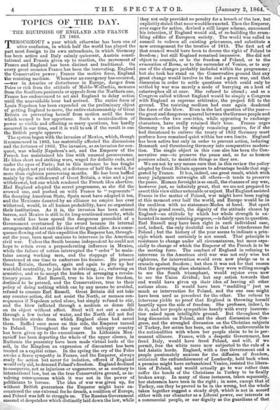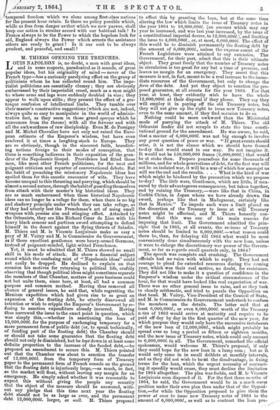TOPICS OF THE D
THE EQUIPOISE OF ENGLAND AND FRANCE IN 1863.
which seemed to her opportune. Such a neutralization of power so visible and affecting so many questions, has hardly occurred in our time, and it is well to ask if the result is one the British people approve. The system began with the invasion of Mexico, which, though
it commenced in 1862, has materially affected the discussions and the fortunes of 1863. The invasion, as an invasion for con- quest, was wholly Napoleon's act, and the Emperor of the French has maintained his line with unusual perseverance. He likes short and striking wars, waged for definite ends, and under the eyes of Paris ; but in this instance he has fought for an object not yet visible, at a distance of half the world, for more than eighteen persevering months. He has been baffled mainly by the withdrawal of Great Britain, a wise and a just withdrawal, but one which rendered the French idea abortive. Had England adopted the secret programme, as she did the avowed one, and pushed on with France to " regenerate" the decaying American State, Spain must have adopted it too, and the Mexicans daunted by an alliance no empire has ever withstood, would, in all human probability, have re-organized their institutions. As it is, the invasion has been almost barren, and Mexico is still in its long-continued anarchy, while the world has been spared the dangerous precedent of a Government overturned by the sword because its internal arrangements did not suit the ideas of its great allies. As a conse- quence flowing out of this expedition the Emperor has, through- out the year, been most anxious to intervene in the American civil war. Unless the South became independent he could not hope to retain even a preponderating influence in Mexico, while the failure of cotton interrupted the " order" he main- tains among working men, and the stoppage of tobacco threatened at one time to embarrass his finance. He pressed Great Britain, therefore, again and again to give up her watchful neutrality, to join him in advising, i.e., enforcing an armistice, and so to accept the burden of arranging a revolu-
tionary peace. Earl Russell, true to his love for freedom, declined to be pressed, and the Conservatives, true to their policy of doing nothing which can by any means be avoided, refused to censure Earl Russell. Great Britain did not take any counter-action, did not assist the North, or menace con- sequences if Napoleon acted alone, but simply refused to stir, and the blow inflicted through a medium so dense fell on its object without effect. Steel will not cut a candle through a few inches of water, and the North did not feel the terrible stroke from which England alone had saved them. Baffled once more on this side, the Emperor turned to Poland. Throughout the year that unhappy country has been given up to the executioners. In Lithuania Mou- ravieff has been deporting the whole of the upper classes, in Ruthenia the peasantry have been made virtual lords of the Boil, in the Kingdom an expression of discontent has been treated as a capital crime. In the spring the cry of the Poles awoke a fierce sympathy in France, and the Emperor, always . ready for action but never for isolation, offered if England would only aid, to demand Poland's freedom. England declined to co-operate, not as injurious or ungenerous, or as contrary to international law, but on the true Conservative ground, as in- volving consequences which it was not in the power of politicians to foresee. The idea of war was given up, for without British guarantees the Emperor might have en- countered the one external foe he dreads, a coalition of Europe, and Poland was left to struggle on. The Russian Government sneered at despatches which di stinctly laid down the law, while they not only provided no penalty for a breach of the law, but explicitly stated that none would be exacted. Then the Emperor, ever eager for action, devised a still larger scheme, announced his intention, if England would aid, of re-building the crum- bling edifice of European society. The world was called to council to redress all existing grievances, and substitute a
new arrangement for the treaties of 1815. The first act of that council would have been to decree the right of Poland to
freedom ; but still England remained impassive. She did not object to councils, or to the freedom of Poland, or to the evacuation of Rome, or to the surrender of Venice, or to any one of the changes probably included within the programme ; but she took her stand on the Conservative ground that any great change would involve in the end a great war, and that discussion in order to settle questions which could only be settled by war was merely a mode of hurrying on a host of catastrophes all at once. She refused to attend ; and as a Congress called without England would be simply a Congress with England as supreme arbitrator, the project fell to the ground. The resisting medium had once again deadened the force of the blow. Even in the last question of the year— the great and dangerous quarrel between the German people and Denmark—the two countries, while appearing to exchange characters, have really retained their tone. France urges Germany to action by simply remaining passive, for if she had threatened to enforce the treaty of 1852 Germany must perforce have remained quiet within her own limits. England has been active but only in order to prevent action, inducing Denmark and threatening Germany into comparative modera- tion. The single object in this case also has been the Con- servative one—to preserve the peace and, so far as human passions admit, to maintain things as they are.
We are not by any means sure that in this review the policy' adopted by Great Britain appears to advantage beside that sug- gested by France. It has, indeed, one great result, which with many judgments outweighs all others—it tends to preserve the peace. Human foresight is so small, the chances of any war,, however just, so infinitely great, that we are not prepared to assert this view eitheruntenable or unjust. Had England assisted. France in the matter of Poland, war might have been raging at this moment over half the world, and Europe would be in the cauldron with no statesman-Medea at hand. But apart from this grand result, the dignity of the attitude chosen by England—an attitude by which her whole strength is ex- hausted in merely resisting progress,—is fairly open to question. Earl Russell may have been right in each individual case, and, indeed, the only doubtful one is that of interference for Poland ; but the history of the year seems to indicate a prin- ciple which most certainly is not sound. That principle is resistance to change under all circumstances, but more espe- cially to change of which the Emperor of the French is to be the moving force. The conduct of England in refusing to intervene in the American civil war was not only wise but righteous, for intervention would even now pledge us to a crusade against freedom ; but then it was not for that reason that the governing class abstained. They were willing enough to see the South triumphant, would rejoice even now to see the Union divided; but any .action towards that. end would have given up their idea of leaving all other nations alone. It would have been "meddling" just as much as intervention for Poland, and the one case might have been used as precedent for the other. The refusal to intervene yields no proof that England is throwing herself heartily upon the side of freedom. She professes, indeeJ, to do it, and her people sympathize keenly with every insurrec- tion raised upon intelligible ground. But throughout the long discussion on Poland, and the short discussion on Con- gress, and the strangled discussion on the Christian subjects of Turkey, her action has been, on the whole, unfavourable to the nationalities with whom her people claim to be in per- manent alliance. France, with a despotic Government, has freed Italy, would have freed Poland, and will, if we permit, free the white races now subjected to the rule of a bad Asiatic horde. England, with a free Government and a people passionately anxious for the diffusion of freedom, criticized the enfranchisement of Lombardy, held back when a promise might have enfranchised Venice, resisted the libera- tion of Poland, and would actually go to war rather than Suffer the bonds of the Christians in Turkey to be finally broken away. In many of these instances, taken separately, her statesmen have been in the right; in none, except that of Turkey, can they be proved to be in the wrong, but the whole taken together suggest a steady drift, which is not in accord either with our character as a Liberal power, our interests as a commercial people, or our dignity as the guardians of that • tempered freedom which we alone among first-class nations for the present hour retain. Is there no policy possible which, while as free from danger as that which we now pursue, shall keep our action in straiter accord with our habitual talk? Is France always to be the Power to which the hopeless look for aid, England always the Power which arrests the assistance others are ready to grant ? Is it our wish to be always prudent, and peaceful, and small ?

















































 Previous page
Previous page